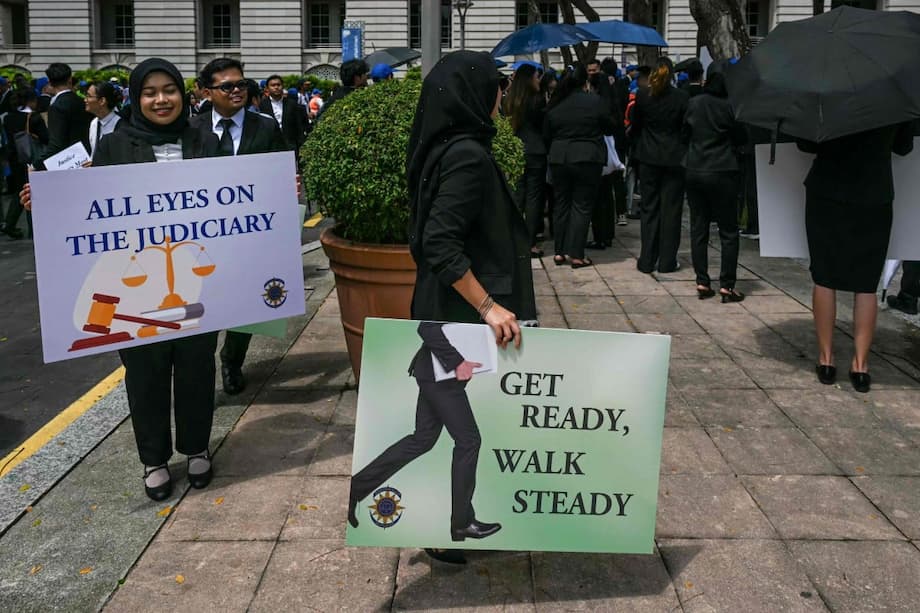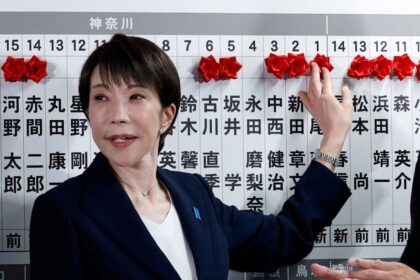Malaysia’s Judiciary Under Pressure: Protests, Politics, and the Battle for Judicial Independence
On a humid July afternoon in Putrajaya, Malaysia’s administrative capital, the streets filled with the black-robed figures of lawyers, their voices echoing calls for the protection of judicial independence. The scene was reminiscent of a pivotal moment in Malaysia’s history, as legal professionals and civil society once again confronted the specter of political interference in the nation’s courts. At the heart of the controversy: Prime Minister Anwar Ibrahim’s alleged role in the delayed and contentious appointment of Malaysia’s top judges, sparking a national debate over the integrity of the country’s legal system.
- Malaysia’s Judiciary Under Pressure: Protests, Politics, and the Battle for Judicial Independence
- Why Are Malaysians Protesting Judicial Appointments?
- Political Fallout: Tensions Within Anwar’s Government
- How Are Judges Appointed in Malaysia?
- Anwar Ibrahim’s Response: Denials and Calls for Respect
- Historical Context: Echoes of Past Judicial Crises
- What’s Next for Malaysia’s Judiciary?
- In Summary
Why Are Malaysians Protesting Judicial Appointments?
The immediate spark for the unrest was the government’s failure to promptly appoint successors to two of Malaysia’s highest judicial offices: the Chief Justice and the President of the Court of Appeal. The retirement of Chief Justice Tengku Maimun Tuan Mat on July 2, 2025, without a successor named, left a leadership vacuum at the top of the judiciary. This was compounded by the simultaneous vacancy of the Court of Appeal’s presidency, as well as the impending retirement of several other senior judges by year’s end.
For many in Malaysia’s legal community, the situation was not merely a bureaucratic hiccup but a threat to the very foundation of the rule of law. The Malaysian Bar, the country’s main legal association, organized a 2.6-kilometer march from the Palace of Justice to the Prime Minister’s Office on July 14, 2025. Around 1,000 lawyers, joined by politicians, activists, and members of the public, demanded urgent action to fill the vacancies and called for a Royal Commission of Inquiry into alleged political interference in judicial appointments.
Ambiga Sreenevasan, a prominent lawyer and former president of the Malaysian Bar, captured the mood of the protest:
“We have had to watch [the government] like a hawk and constantly keep tabs, which we never wanted to do,”
she told reporters, referencing the parallels with the 1988 judicial crisis when then-Prime Minister Mahathir Mohamad removed senior judges over contentious rulings.
Key Demands of the Malaysian Bar
- Immediate appointment of qualified and independent judges to fill top vacancies
- Release of the Judicial Appointments Commission (JAC) meeting minutes to the public
- Establishment of a Royal Commission of Inquiry to investigate alleged interference
- Reforms to safeguard judicial independence and transparency
The Bar’s president, Mohamad Ezri Abdul Wahab, emphasized that judicial independence is a guarantee of the rule of law and that “silence is not an option.”
Political Fallout: Tensions Within Anwar’s Government
The controversy quickly spilled into the political arena. Nine lawmakers from Anwar’s own People’s Justice Party (PKR), led by former economy minister Rafizi Ramli, publicly called for a royal inquiry and a parliamentary investigation into the delays and alleged irregularities. This rare act of dissent from within the ruling coalition signaled deep unease about the government’s handling of the judiciary.
Adding to the drama, Nurul Izzah Anwar, Anwar’s daughter and PKR deputy president, joined the lawyers’ march, further complicating the party’s position. Her participation was seen as an endorsement of the Bar’s demands, even as the party leadership maintained there was no crisis. Rafizi Ramli noted that Nurul Izzah’s attendance put the party in an awkward position, given its official stance.
Public attention intensified after purported minutes from a JAC meeting were leaked, suggesting attempts to fix judicial appointments. The authorities responded by launching an investigation into the leak under the Official Secrets Act, but the damage to public trust had already been done.
Broader Public Response and Civil Society Mobilization
The July 14 march was not an isolated event. Hundreds of civil society members, including representatives from NGOs such as Bersih 2.0 and the Centre to Combat Corruption and Cronyism, joined the protest. The scale of the demonstration, coupled with calls for transparency from both ruling and opposition lawmakers, underscored the depth of concern over the judiciary’s future.
In the days that followed, thousands more Malaysians rallied in Kuala Lumpur, with some demanding Anwar’s resignation over alleged unfulfilled promises and the judicial controversy. Former prime minister Mahathir Mohamad, himself a central figure in past judicial crises, headlined one such rally, highlighting the high political stakes involved.
How Are Judges Appointed in Malaysia?
Understanding the controversy requires a look at Malaysia’s judicial appointment process. Under Article 122B of the Federal Constitution, the Chief Justice and other top judges are appointed by the King, acting on the advice of the Prime Minister and after consulting the Conference of Rulers (a council of Malaysia’s hereditary state monarchs). The Judicial Appointments Commission (JAC), established in 2009, is tasked with recommending candidates to the Prime Minister, who then forwards the names to the King.
Critics argue that this system gives the Prime Minister significant influence over judicial appointments, potentially undermining the separation of powers. The recent controversy centered on claims that Anwar ignored the JAC’s recommendations and delayed the process, fueling suspicions of political maneuvering.
The Appointment of Wan Ahmad Farid Wan Salleh
After weeks of uncertainty, the King appointed Wan Ahmad Farid Wan Salleh, a judge from the Court of Appeal, as the new Chief Justice on July 18, 2025. The appointment was notable for several reasons:
- Wan Ahmad was elevated from the Court of Appeal, bypassing 32 more senior judges from the Federal Court and High Court—an unprecedented move in Malaysia’s legal history.
- He previously served as a deputy home minister and was a member of the United Malays National Organisation (UMNO), raising concerns about his impartiality in cases involving political figures.
- The appointment was seen by some as a compromise after public resistance to other rumored candidates, including a former attorney general closely linked to Anwar.
While the government and some media outlets portrayed the appointment as a win for judicial independence, critics saw it as evidence of continued political influence and a blow to meritocracy within the judiciary.
Anwar Ibrahim’s Response: Denials and Calls for Respect
Prime Minister Anwar Ibrahim has repeatedly denied interfering in judicial affairs. In public statements, he insisted that he has “never interfered with the court’s decisions” during his tenure and that the government is committed to upholding judicial independence. At the 37th LawAsia Conference, Anwar declared:
“The era of the government tampering with judicial independence for politics’ sake is over… We will never allow such abuse and violations ever to happen again.”
Anwar also expressed support for the Malaysian Bar’s right to protest, provided that all parties respect constitutional processes. The Attorney-General’s Chambers and the royal palace (Istana Negara) echoed this sentiment, urging that the appointment of judges follow the Federal Constitution and warning against politicizing the process.
Despite these assurances, skepticism remains. Critics point to the government’s refusal to extend the tenure of the respected outgoing chief justice, the unprecedented leapfrogging of Wan Ahmad over more senior judges, and the broader pattern of political appointments in law enforcement and the judiciary as evidence of continued executive overreach.
Historical Context: Echoes of Past Judicial Crises
The current controversy is not without precedent. Malaysia’s judiciary has faced political pressure before, most notably in 1988 when then-Prime Minister Mahathir Mohamad orchestrated the removal of senior judges following rulings unfavorable to his administration. That episode left a lasting scar on the judiciary’s reputation and led to decades of efforts to restore public trust.
Ironically, Anwar Ibrahim himself was once a victim of Malaysia’s politicized courts, having been imprisoned on charges widely seen as politically motivated. The 2018 election, which brought Anwar’s Pakatan Harapan coalition to power, was hailed as a turning point for Malaysian democracy, with promises of institutional reform and judicial independence. The recent events have led some observers to question whether those reforms are being reversed.
Expert Perspectives: The Stakes for Malaysian Democracy
Legal scholars and democracy advocates warn that the integrity of the judiciary is central to Malaysia’s democratic transition. As the Journal of Democracy notes, confronting authoritarian tendencies requires robust judicial independence, protection of political freedoms, and good governance.
Former chief justice Tengku Maimun Tuan Mat, speaking at a legal conference earlier this year, emphasized the importance of judicial power in upholding democracy:
“The exercise of such powers (of the courts to affirm constitutional supremacy) not just protects and preserves democracy but guarantees its continued existence. I would therefore urge such parties not to be afraid of them and seek to curtail them, but to uphold them.”
Opinion pieces in local media have been sharply critical of Anwar’s handling of the appointments, arguing that bypassing senior judges and ignoring meritocracy undermines morale within the judiciary and erodes public trust. Some warn of a return to the “dark ages” of judicial control by political elites.
What’s Next for Malaysia’s Judiciary?
With the appointment of Wan Ahmad Farid Wan Salleh as Chief Justice, the immediate crisis of leadership at the top of Malaysia’s judiciary has been resolved. However, the underlying issues remain. The controversy has exposed deep fissures within the ruling coalition, shaken public confidence in the legal system, and reignited debates over the need for further reforms to insulate the judiciary from political influence.
The Conference of Rulers, which plays a constitutional role in judicial appointments, is expected to continue deliberating on the process. Meanwhile, the Malaysian Bar and civil society groups have vowed to keep up the pressure for transparency and accountability.
In Summary
- Malaysia’s judiciary faced a leadership crisis in July 2025 after the retirement of top judges without immediate successors, sparking protests and allegations of political interference.
- The Malaysian Bar led a major march demanding urgent appointments, transparency, and a Royal Commission of Inquiry into alleged interference.
- Prime Minister Anwar Ibrahim and his government denied any wrongdoing, insisting that judicial independence remains intact and that appointments followed constitutional procedures.
- The eventual appointment of Wan Ahmad Farid Wan Salleh as Chief Justice, bypassing more senior judges, was seen by critics as evidence of continued political influence.
- The controversy has exposed internal divisions within the ruling coalition and raised broader questions about the future of judicial independence and democratic reform in Malaysia.












